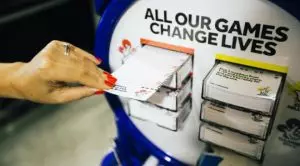 The Camelot Group has been the operator of the UK National Lottery since it was first launched. However, the company has recently lost its operating licence as the UK Gambling Commission (UKGC) surprisingly decided to ditch the current owner of the National Lottery’s operating permit and welcome another company on the lead.
The Camelot Group has been the operator of the UK National Lottery since it was first launched. However, the company has recently lost its operating licence as the UK Gambling Commission (UKGC) surprisingly decided to ditch the current owner of the National Lottery’s operating permit and welcome another company on the lead.
As Casino Guardian reported, in mid-March 2022, the country’s gambling regulatory body announced the Czech gambling group Allwyn as its preferred candidate for the licence for the next 10-year period. The news hit Camelot hard, as it was hoping to get the operating permit once again – in fact, the blow was so hard, that the National Lottery operator is now taking the UKGC to court.
Although the change has been anticipated by some experts, some found it hard to understand why Allwyn was preferred as the new operator of the National Lottery and what exactly did it promise to do differently to Camelot. The question still looms in the air because, for the time being, the UK Gambling Commission has not listed the reasons behind its decision, and the ongoing court battle is making it even harder to get information about its past decision-making process.
The gambling regulator of the UK has provided some assurance that the competition and the decision-making were open, fair and robust but some find it hard to believe that, considering the little to no information about the reasons why the Commission made such a choice in the end.
Pledged Contributions to Good Causes May Have Been the Breaking Point for National Lottery Licence Competition
 According to some experts, the breaking point was Allwyn’s pledge to remain focused on raising £38 billion for good causes over the next 10 years of the National Lottery operation. Even though current inflation levels need to be taken into account, the amount would compare favourably against the overall £45 billion that were gathered by Camelot and provided to good causes since the inception of the National Lottery in 1994.
According to some experts, the breaking point was Allwyn’s pledge to remain focused on raising £38 billion for good causes over the next 10 years of the National Lottery operation. Even though current inflation levels need to be taken into account, the amount would compare favourably against the overall £45 billion that were gathered by Camelot and provided to good causes since the inception of the National Lottery in 1994.
Still, the UKGC has not yet endorsed the £38-billion figure although it has called for increased contributions to good causes throughout the years.
Throughout the application process, Camelot has probably also made a promise to up the ante in terms of the money raised for good causes and charitable projects, just like the rest of the bidders for the National Lottery licence have done. Unfortunately for the current owner of the operating permit, the UK Gambling Commission seems to have found the credibility of Allwyn’s engagement more prominent so that it eventually decided to strip Camelot of the operating licence and hand it to the Czech gambling group.
Allwyn has managed to perform some of its fundraising activities beautifully, although it still had to clear some more serious objectives to win the operating permit. In addition, Camelot’s ongoing legal challenge that has brought the UKGC to court could affect its newly-announced role or at least delay the inception of its new role.
Camelot was originally formed as a consortium between International Computers Limited (ICL), Racal, Cadbury Schweppes, De La Rue and GTECH Corporation to bid for the National Lottery operating licence. The Camelot Group was officially awarded the franchise of the National Lottery in May 1994. Since then, the company has remained the one offering the products and services of the National Lottery, until the UKGC held the competition for the fourth operating permit which was eventually won by Allwyn.
Not everything went perfectly smoothly over the time when Camelot held the operating licence of the National Lottery. In 2000 and 2001 some franchise controversy occurred, and in 2009 the company was involved in a jackpot ticket fraud that has left a stain on its reputation. Almost ten years later, in 2018 the Camelot Group faced a £1.15-million fine by the UK gambling regulator because of the launch of its malfunctioning mobile application.
- Author


